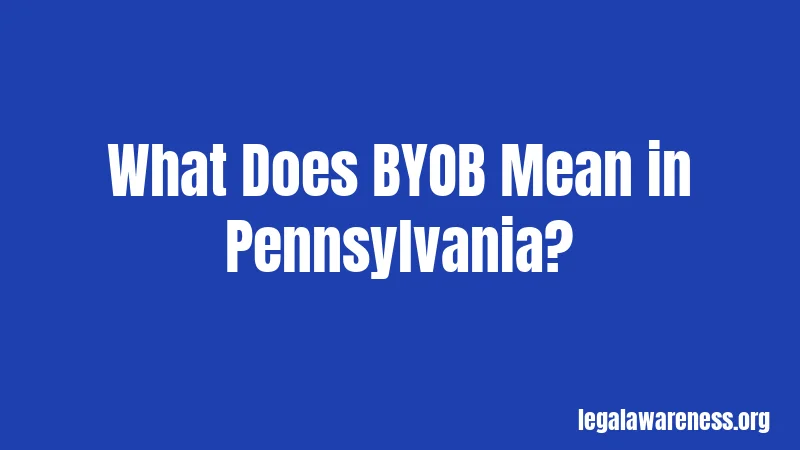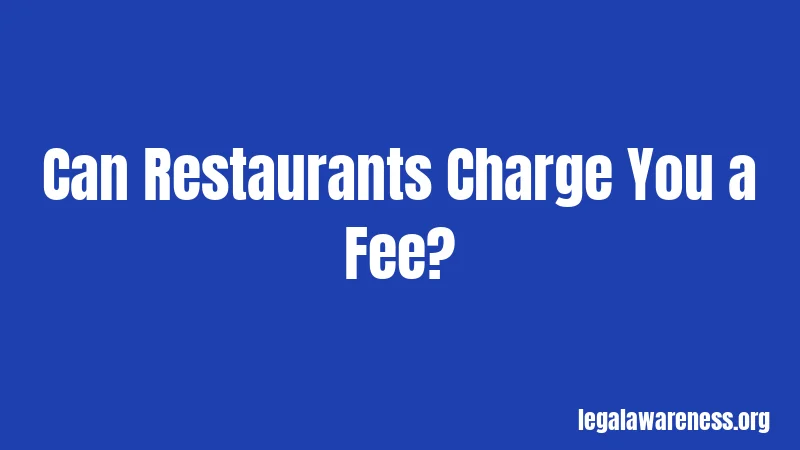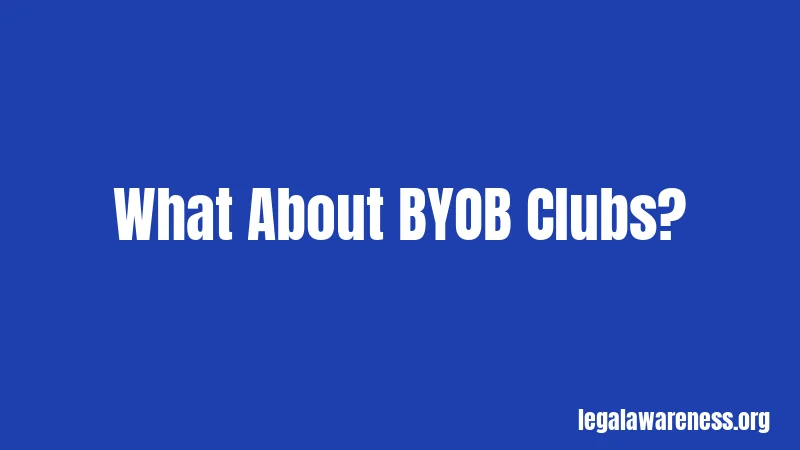BYOB Laws in Pennsylvania (2026): Your Complete Guide
Most people think BYOB is just about bringing wine to dinner. But in Pennsylvania, the rules are way more interesting than that. And honestly? Some of them might surprise you.
Pennsylvania’s BYOB laws are actually pretty relaxed compared to other states. But there are still important rules you need to know. Let’s break down exactly what you can do, what you can’t do, and how to stay out of trouble.
What Does BYOB Mean in Pennsylvania?

BYOB stands for “Bring Your Own Bottle.” Pretty straightforward, right?
In Pennsylvania, it means you can bring your own alcoholic drinks to certain restaurants and venues. You bring the bottle. They provide the glasses and ice. Everyone’s happy.
Here’s the thing though. Not every place allows it. The establishment gets to decide whether they want to allow BYOB or not.
The Basic Rules You Need to Know
Pennsylvania doesn’t require businesses to get a special liquor license to allow BYOB. That’s actually a big deal. It means lots of restaurants can let you bring your own drinks without spending thousands on a license.
But wait, there’s more to it.
The alcohol you bring must be legally purchased. You can’t bring moonshine from your cousin’s backyard still. It needs to come from a legal source like a state store or licensed retailer.
You must be 21 or older to bring or drink alcohol. No exceptions. Even if your parents are with you, if you’re under 21, you can’t drink at a BYOB restaurant.
Can Restaurants Charge You a Fee?

Okay, this one confuses a lot of people.
At the state level, Pennsylvania says restaurants without liquor licenses cannot charge corkage fees. Zero. Nada. Nothing.
If a restaurant doesn’t have a liquor license, they can’t charge you to open your bottle or use their glasses. That’s the official rule from the Pennsylvania Liquor Control Board.
But here’s where it gets tricky. Some local municipalities have their own rules. And restaurants with liquor licenses might be able to charge corkage fees in some areas.
Confused? You’re not alone.
The safest bet is to call ahead and ask. Different places have different policies. Some charge $25 to $35 per bottle. Others charge nothing at all.
Local Rules Can Be Different
Here’s something that trips people up constantly.
Pennsylvania state law says one thing. But your city or borough might say something else. Local governments can add their own BYOB rules on top of state law.
Some cities require BYOB establishments to get special permits. Others have strict hour restrictions. A few even ban BYOB clubs entirely in certain neighborhoods.
For example, West Chester requires BYOB facilities to get a permit. Harrisburg requires BYOB clubs to register with the police. Lancaster has its own set of rules too.
These local permits typically cost between $50 and $100 per year. Not a huge expense, but businesses need to know about it.
Sound complicated? It is.
What About BYOB Clubs?

BYOB clubs are different from BYOB restaurants. Totally different category.
A BYOB club is a place like a dance hall or social club where you pay an entry fee and bring your own drinks. Think of it like a nightclub without a liquor license.
Many Pennsylvania cities regulate these more strictly than regular restaurants. They often require special permits, insurance, and regular inspections.
In Harrisburg, BYOB clubs need $1 million in liability insurance. They also can’t operate between 2:00 AM and 8:00 AM if they’re near homes, schools, or hospitals.
The penalties for running an unlicensed BYOB club can be serious. We’re talking fines, permit revocation, and possible criminal charges.
What Can You Bring?
Most BYOB restaurants in Pennsylvania let you bring wine or beer. Some allow hard liquor too, but not all.
Each restaurant sets its own rules. Some only allow wine. Others are cool with beer, wine, and spirits. A few even let people bring ingredients for mixed drinks.
You should always call ahead and ask what’s allowed. Don’t just show up with a bottle of tequila and mixers if you haven’t checked first.
Also, bring unopened bottles when possible. Some places won’t let you bring in an already-opened container.
The Age Restrictions Are Serious
Pennsylvania doesn’t mess around with underage drinking. The legal drinking age is 21. Period.
In a BYOB establishment, you can’t drink if you’re under 21. Even if your parents bring the alcohol. Even if they’re sitting right next to you.
Some local ordinances are even stricter. West Chester, for example, says adults can’t drink at a table where someone under 18 is seated unless that minor is with a parent or guardian.
BYOB venues are responsible for checking IDs. If they let minors drink, they can face serious legal consequences under social host liability laws.
Here’s what happens if you’re caught drinking under 21. First offense means a 90-day license suspension. Second offense? One year. Third offense? Two years.
Those penalties hurt. Don’t risk it.
Can You Take Leftovers Home?
Yes, but with conditions.
Pennsylvania law lets you take unfinished bottles home from a restaurant if they’re properly resealed. The bottle needs to be sealed tight enough that it won’t leak if you turn it upside down.
Bring a wine stopper or bottle carrier with you. It’s the classy way to do it.
Keep in mind that open container laws still apply when you’re driving. The resealed bottle should go in your trunk, not the front seat.
Liability Issues for Restaurants
BYOB restaurants can still get sued even though they don’t sell alcohol. Seriously.
Pennsylvania has something called “social host liability.” If a BYOB restaurant lets someone get visibly drunk and that person causes harm, the restaurant might be held responsible.
Dram shop laws mostly apply to licensed establishments. But BYOB venues can still face negligence lawsuits if they’re not careful.
Smart BYOB restaurants monitor their customers. They’ll cut people off if they seem too intoxicated. They check IDs religiously.
It’s all about protecting themselves and their customers.
What Restaurants Can’t Do
BYOB restaurants without liquor licenses cannot sell alcohol. That seems obvious, but it’s worth stating clearly.
They can’t charge you for the alcohol itself. They can’t add it to your bill. They can’t include it in a “package price.”
At the state level, unlicensed restaurants also can’t charge corkage fees. Though as mentioned earlier, local rules sometimes vary.
They definitely can’t serve alcohol to minors. Ever. That’s a fast track to serious legal trouble.
Penalties for Breaking the Rules
For customers under 21 who drink at BYOB places, the penalties include mandatory fines and license suspensions. The suspensions get longer with each offense.
For businesses, the penalties depend on what they did wrong and where they’re located.
Operating a BYOB club without required permits can result in fines from $100 to $1,000 in many municipalities. Some areas like West Chester start at $50 for a first offense.
Repeat violations get more expensive. And businesses can lose their permits entirely if violations continue.
If a business serves minors or allows them to drink, the consequences are much more serious. Criminal charges are possible depending on the circumstances.
Recent Changes You Should Know About
Pennsylvania updated its alcohol laws in 2024 with Acts 57 and 86. These changes went into effect on September 16, 2024.
The new laws extended happy hour times and made other changes to licensed establishments. They didn’t directly change BYOB rules at the state level.
But the changes show Pennsylvania is slowly loosening its strict alcohol regulations. That’s good news for restaurants and customers alike.
The state has also been discussing whether to let wineries partner with BYOB restaurants to sell wine. That bill hasn’t passed yet, but it’s being considered.
How to Find BYOB Restaurants
Many Pennsylvania restaurants advertise themselves as BYOB. Especially in cities like Philadelphia.
Philadelphia is actually famous for its BYOB restaurant scene. There are tons of great places that let you bring your own wine or beer.
When you’re looking for a BYOB spot, just call ahead. Ask what they allow. Ask if there’s a corkage fee. Ask if they provide glasses and ice.
Most places are happy to explain their policies. They want you to have a good experience.
What to Bring When You Go
If you’re heading to a BYOB restaurant, bring your alcohol in unopened bottles when possible. Bring a bottle opener or corkscrew just in case.
Here’s something important. Bring your receipt from the purchase. Technically, the law says alcohol must be “legally procured” in Pennsylvania. Some establishments ask for receipts as proof you bought it legally.
Is this always enforced? Not really. But the official PLCB guidance advises licensed establishments to ask for receipts. It protects them from liability if the alcohol was illegally obtained.
Most unlicensed BYOB restaurants don’t check. But it’s smart to keep your receipt just in case. Better safe than sorry.
Consider bringing a wine carrier or tote bag for leftovers. It makes taking home unfinished bottles easier.
Don’t bring cheap stuff to nice restaurants. It’s just good etiquette. Match the quality of your alcohol to the quality of the restaurant.
And please, tip well. The server is still providing service even though they’re not selling you the drinks.
Tips for Restaurant Owners
If you’re running a BYOB establishment, check your local laws first. Call your city or borough offices. Ask what permits you need.
Get proper insurance. Liability coverage is essential. Some local governments require minimum coverage amounts.
Train your staff to check IDs. Train them to recognize signs of intoxication. Make sure they know when to cut someone off.
Post your BYOB policies clearly. Let customers know what they can bring. Tell them if there’s a fee.
And keep good records. Document any incidents. Keep copies of all permits and licenses.
Frequently Asked Questions
Do I need a license to bring alcohol to a restaurant in Pennsylvania?
No, you don’t need a license as a customer. As long as you’re 21 or older and the alcohol is legally purchased, you can bring it to establishments that allow BYOB.
Can restaurants charge me to open my bottle?
State law says unlicensed restaurants cannot charge corkage fees. However, local laws may vary, and licensed establishments might charge fees. Always ask ahead of time.
Can I bring hard liquor to a BYOB restaurant?
It depends on the restaurant’s policy. Some allow only wine and beer, while others permit spirits. Call ahead to confirm what’s acceptable.
What happens if I’m under 21 and drink at a BYOB restaurant?
You face mandatory fines and license suspension. First offense means 90 days without your license. Second offense is one year. Third offense is two years.
Can I take my unfinished bottle home?
Yes, as long as it’s properly resealed. The seal must be tight enough that the bottle won’t leak when turned upside down. Transport it in your trunk to comply with open container laws.
Final Thoughts
Pennsylvania’s BYOB laws give you freedom to enjoy your own drinks at restaurants. But you need to know the rules to stay legal.
The state rules are pretty simple. Local rules can get complicated. When in doubt, call ahead and ask.
Stay safe. Drink responsibly. And enjoy your meal with your favorite bottle of wine.
References
- Pennsylvania Liquor Control Board – BYOB FAQ: https://www.pa.gov/content/dam/copapwp-pagov/en/lcb/documents/legal/documents/legal_faqs_byob.pdf
- Pennsylvania Acts 57 and 86 of 2024 (Happy Hour Law Updates): https://home.getsauce.com/post/new-pennsylvania-liquor-laws-loosen-restrictions
- West Chester Borough BYOB Regulations: https://ecode360.com/32614855
- Harrisburg BYOB Club Ordinance: https://ecode360.com/13739414
- Pennsylvania Underage Drinking Laws: https://www.pddlaw.net/practice-areas/criminal-law/juvenile-law/under-age-drinking-defense/
